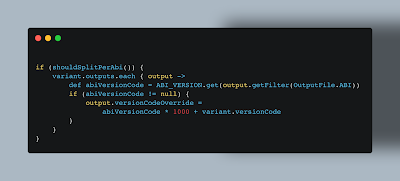If you are building Flutter app and shows app version in-app for users to see (mostly testers). You may run into a weird issue that the version code is different from the configured value. E.g. if you run `flutter build --build-number=1234` it will show up as `3234`, 123 shows up as `2123`... What the hell is happening?
flutter.gradle#L864-L876 is the culprit.
Basically `--split-per-abi` will increase the version code number by 1000, 2000, 3000, etc. as seen above. If you don't want that behavior, just build one single fat APK.

Comments
Post a Comment